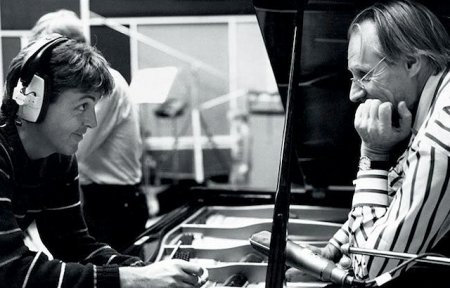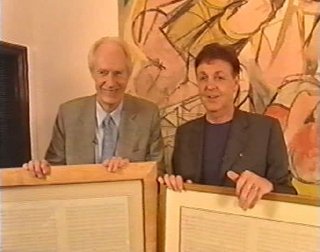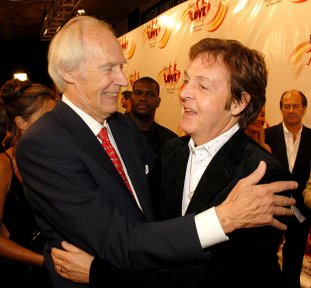Sir George Martin obituary
The ‘fifth Beatle’, a talented musician and producer
who oversaw landmark albums and helped the band to stretch the boundaries
of sound recording
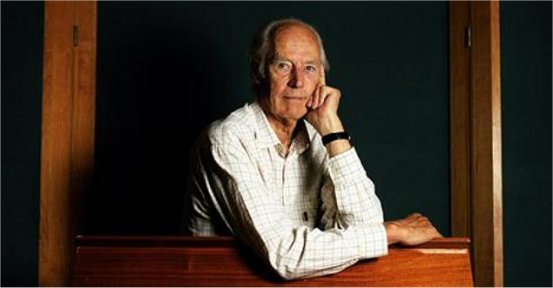 The death of George Martin at the age of 90 is not only a
sad blow to Beatles fans of all generations, but it also draws a line under
a vanished age of the entertainment business. Martin’s work as the Beatles’
producer, overseeing such landmarks of popular music as Rubber Soul, Revolver,
Sgt Pepper’s Lonely Hearts Club Band and Abbey Road, has guaranteed that
his reputation will live as long as that of his illustrious proteges.
The death of George Martin at the age of 90 is not only a
sad blow to Beatles fans of all generations, but it also draws a line under
a vanished age of the entertainment business. Martin’s work as the Beatles’
producer, overseeing such landmarks of popular music as Rubber Soul, Revolver,
Sgt Pepper’s Lonely Hearts Club Band and Abbey Road, has guaranteed that
his reputation will live as long as that of his illustrious proteges.
Martin and the Beatles were stretching the known boundaries
of sound recording almost every time they entered the studio. “When I started,
there really weren’t more than a handful of producers,” Martin commented.
“Now everyone thinks they’re a producer. Technology has been getting more
sophisticated every day. You can make a tune that isn’t that great sound
wonderful. This stifles creativity, because you don’t have to work for
it, it’s already there.”
A trained musician, Martin possessed invaluable arranging
skills. He helped the Beatles to find striking juxtapositions of sounds
and electronic effects previously unheard outside the more freakish fringes
of the avant garde, in the process helping to justify pop music’s claims
to be something more than a cellarful of noise. But perhaps most important
was his capacity for making his clients raise their game to levels they
themselves hadn’t believed possible.
Martin sensed that it was more a matter of psychology
than technology. “I realised I had the ability to get the best out of people,”
he reflected. “A producer has to get inside the person. Each artist is
very different, and there’s a lot of psychology in it.”
After his groundbreaking work with the Beatles, Martin
had earned his ticket to ride, and he worked with a spectrum of luminaries
including Jeff Beck, the Mahavishnu Orchestra, America, Jimmy Webb, Kenny
Rogers, Ultravox and Elton John. He produced Shirley Bassey’s theme song
for the Bond movie Goldfinger (1964), and composed the score for a further
Bond, Live and Let Die (1973), as well as producing its title song, which
was performed by Paul McCartney and Wings.
Before rock’n’roll transformed his career, he had already
been well known for his work with jazz and popular musicians such as Stan
Getz, Cleo Laine, John Dankworth and Judy Garland, but what especially
endeared him to the Beatles was his track record of producing comedy albums,
particularly with the Goons and Peter Sellers. John Lennon and George Harrison
were aficionados of Goon-humour, and they swiftly struck up a close rapport
with Martin.
It has long been a part of Beatle mythology that Martin
was the debonair toff who transformed the fortunes of four leather-clad
scruffs from Liverpool, but the truth was not so cut and dried. “It’s a
load of poppycock really, because our backgrounds were very similar,” Martin
argued. “Paul and John went to quite good schools. I went to elementary
school, and I went to Jesuit college. We didn’t pay to go to school, my
parents were very poor. I wasn’t taught music and they weren’t, we taught
ourselves.”
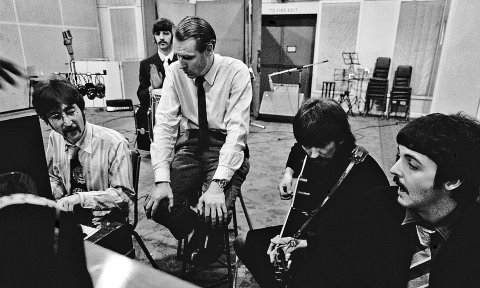
George Martin with the Beatles at Abbey Road.
Born in Holloway, north London, George was the son of
Henry, a carpenter, and Bertha (nee Simpson), a cleaner, and studied at
St Ignatius college, Stamford Hill, and Bromley county school, in south-east
London. Having taught himself to play the piano, he was running his own
dance band at school by the time he was 16.
By way of second world war service, in 1944 Martin joined
the Fleet Air Arm. He flew as an observer and achieved the rank of sub-lieutenant.
It was there that he acquired the patina of patrician lordliness that would
become his trademark, an effect intensified by his aquiline profile topped
by a swept-back mane of hair. No wonder the acerbic John Lennon referred
to him as “Biggles”. Paul McCartney commented: “He’d dealt with navigators
and pilots. He could deal with us when we got out of line.”
After being demobbed in 1947, Martin studied at the Guildhall
School of Music and Drama, London, for three years, specialising in composition
and orchestration. In 1950 he joined Parlophone Records, part of the EMI
group of companies, and in 1955 was made head of the label. But it was
not until 1962 that Martin was approached by the Beatles’ manager, Brian
Epstein, who, having had his group rejected by Phillips, Decca and Pye,
was anxious to find a pair of sympathetic ears in the London-based record
business.
Epstein almost failed to get anywhere with Martin as well,
since the Parlophone boss considered that the Beatles’ demo tape “wasn’t
very good... in fact it was awful”. But Martin recognised that the group
had ambition and charisma, and once drummer Pete Best had been replaced
by Ringo Starr, he could see that that the necessary ingredients were in
place.
Nevertheless, even Martin had not foreseen the extraordinary
blossoming of the songwriting talents of John Lennon and Paul McCartney.
Having started out writing shoddy, derivative tunes, they suddenly began
churning out a goldmine of great pop songs, from I Want to Hold Your Hand
and A Hard Day’s Night to Strawberry Fields Forever and Back in the USSR.
Under Martin’s guidance, for the rest of the decade the band made advances
in writing, arrangement and use of technology that transformed pop music.
Strawberry Fields, in particular, is often cited by contemporary producers
as a revolutionary achievement.
Though he will always be chiefly remembered for his Beatles
work, Martin had numerous other achievements to his credit. Perhaps frustrated
by being tied to the terms of his employment contract with EMI, in 1965
he formed his own independent production company, Associated Independent
Recordings (AIR), which lent its name to the AIR studio complex on the
Caribbean island of Montserrat in the decade till it was forced to close
after a hurricane in 1989, and more recently to AIR studios in Hampstead,
north London.
Besides being in steady demand as a producer, Martin participated
in a TV documentary marking the 25th anniversary of the Sgt Pepper album
in 1987, and in 1993 published a book, Summer of Love – The Making of Sgt
Pepper. He examined various aspects of music-making in the BBC TV series
The Rhythm of Life (1997) and in his books All You Need Is Ears (1979)
and Making Music (1983), and produced the Beatles Anthology double-CD sets
in the 1990s. He was knighted in 1996, and in the following year produced
Elton John’s reworking of Candle in the Wind, in memory of Princess Diana.
It became the bestselling single of all time.
In 1998, he masterminded his own musical swansong with
In My Life, an album of Beatles songs performed by an all-star assortment
of actors and musicians including Sean Connery, Goldie Hawn, Robin Williams,
Celine Dion and Phil Collins. “I’ve had a bloody good innings,” said Martin.
“Knowing that I would have to finish, I decided I would make my own last
record. It’s a kind of tribute, too, to all the people that I’ve been lucky
to work with over the years.”
However, there was still more to come. The six-CD set
entitled Produced By George Martin: 50 Years in Recording (2001) was a
survey of his entire studio career, and and it was followed by Martin’s
illustrated memoir, Playback (2002). George and his son Giles were music
directors of the Cirque du Soleil show Love (2006), a theatrical interpretation
of the Beatles’ work featuring 80 minutes of their music remixed by the
two Martins and staged in Las Vegas. In 2011 the BBC2 series Arena aired
a 90-minute documentary, also called Produced By George Martin, tracing
his life and career, with contributions from many of the artists he had
worked with.
In 1948 he married Sheena Chisholm, with whom he had two
children, Alexis and Gregory. That marriage ended in divorce, and in 1966
he married Judy Lockhart Smith, with whom he had two further children,
Lucy and Giles. He is survived by Judy and his children.
George Henry Martin, record producer, born 3 January 1926; died 9
March 2016
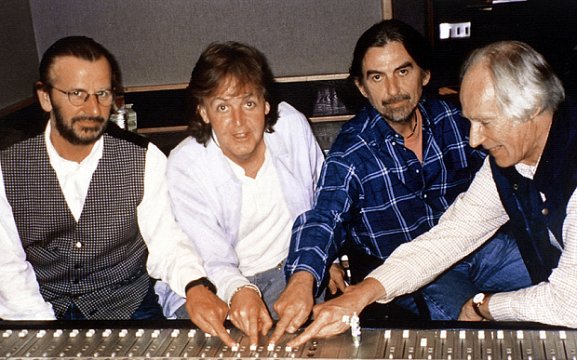
Ref: 




